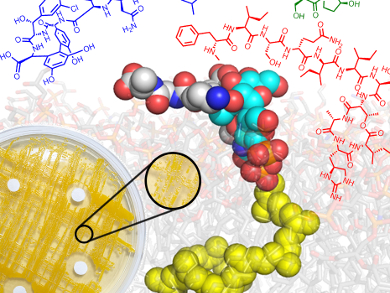The discovery of the first antibiotic penicillin by Alexander Fleming in the 1930s saved millions of lives. However, in recent years, the widespread overuse of antibiotics, even for the treatment of harmless diseases, has contributed to the emergence of numerous antibiotic-resistant bacterial strains. The quest to find new potent antibacterial agents against such strains is a pressing demand now more than ever.
Weng C. Chan and colleagues, University of Nottingham, UK, have summarized the recent advances in the discovery of antibiotics with a focus on novel lipid II inhibitors. These antibiotics prevent the bacterial cell-wall synthesis of gram-positive bacteria. They bind to precursor molecules and inhibit the production of the peptidoglycan layer of the cell wall. Examples of this type of compound are teixobactin (an 11-residue macrocyclic depsipeptide discovered in 2015) and mannopeptimycin (a complex cyclic glycopeptide discovered in 2003).
According to the researchers, these inhibitors may solve the global infection crisis that is associated with the emergence of a high number of resistant bacterial strains.
- New Found Hope for Antibiotic Discovery: Lipid II Inhibitors,
Vivian Ng, Weng C. Chan,
Chem. Eur. J. 2016.
DOI: 10.1002/chem.201601315




